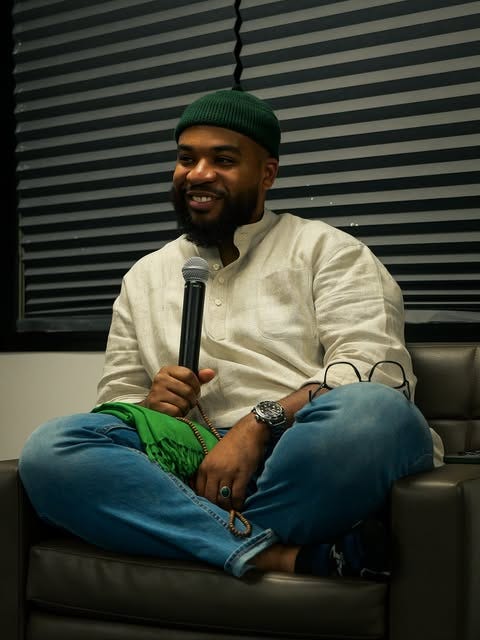Friendship: Deep, Not Wide
A story of nearly 20 years of friendship—imperfect, unlikely, and maybe, just maybe, for the sake of Allah.
Disclaimer: I completed writing this paper on September 2nd; however, I was inspired by the Prophet’s hijra to Madinah ﷺ juxtaposed with my life’s transitions, so I wrote “The Trials of Transition: What We Leave, What We Carry” and published it first. This was written, as usual, as a khaatir (reflection) and not in response to any specific event or occurrence in the larger community.
“Why don’t you just stay with us?” is what I told Imam Farhan Siddiqi back in 2008.
I had just finished my first semester in Umm al-Qura’s Arabic program when I heard that an American student was looking for a place to stay in the dorms. All the beds in our room were taken, so I walked with him to the other dorms to help find a space. It was tough—he had recently left his own apartment, and due to visa issues, his pregnant wife had returned home alone. While my dorm wasn’t luxurious by any means, the other places we saw were far worse. So, despite not knowing each other for more than a few days, he agreed to stay with us.
What I quickly realized was that Farhan and I couldn’t have been more different. I was eighteen, living away from my mother’s home—and America—for the first time. He was twenty-five, already married, and had lived in multiple countries. I was a quiet, obedient kid raised by a religious Blackamerican single mom who listened to alternative rock and smooth jazz. He was a confident rebel raised in a Pakistani immigrant household, listening to hardcore hip-hop. About the only thing we had in common was that we were both trying to study Islam.
MashaAllah, nearly twenty years later—despite being different in so many ways, despite life changes, relocations, and even working for the same organization—we’re still friends, Al-Humdulillah. Just last month, we spoke on the same stage and our differences were literally in full display—me in jeans and a beanie, him in full Khaleeji regalia. After the event, I found myself reflecting: What has allowed our friendship to last this long? What held us together through it all?
Humility
When Farhan and I first started spending time together, I was utterly lost. I had just arrived in Makkah, and every week I found myself floating between different groups—hanging with the Brits, then the older American students about to graduate, then the younger guys who were just trying to have fun. I didn’t have a study plan. I didn’t have rhythm. I was burning through my stipend without any idea how to sustain myself, and I was far too proud to admit I was struggling.
Farhan never sat me down and said, “Let me teach you how to live.” There was no formal mentorship agreement. He just quietly pulled me under his wing. I now recognize that for him, it was important that I learn to become self-sufficient and stable—values that would later define my life. He once told me, “You’re a young man. You’ve got to stop running to mommie every time you overspend.” Then, instead of leaving me to figure it out on my own, he introduced me to the university cafeteria, which offered subsidized meals I didn’t even know existed. He showed me how to track taxi rides to the Haram so I could create a steady schedule. In a short time, I was living off half my stipend and using the rest for books. What I didn’t know at the time was that he also called my mom behind my back and told her to stop sending me extra money.
He also wouldn’t help me search Google. I remember asking him to help me find something online and him just saying, “Bro, figure it out.” It sounds small, but those were formative moments—acts of tough love that forced me to grow. Now, much older myself, I can better appreciate what it must have been like for Farhan. As an Imam today, I have the luxury of going home at the end of the day, or choosing not to answer my phone if I need space (sorry guys, lol). But Farhan lived with me. And at the time, I was loud, extroverted, and often unaware of how much space I took up emotionally and socially.
What stands out most to me now is the humility he embodied. Despite being older, wiser, and more spiritually grounded, he never made me feel small. He never asserted himself to dominate or impose his way of thinking. Instead, he offered quiet guidance and gave me the space to grow at my own pace. That kind of humility—to live with someone so different, without ego or entitlement—is rare. He could have found another room or rented a separate apartment. But he stayed. He walked alongside me, not above me.
Most of my life, I’ve been surrounded by friends older than me. But Farhan was different. This was the first time I experienced real tough love. And it wasn’t easy. I didn’t take it well at first. As soon as I’d start complaining, he’d imitate Arnold Schwarzenegger in Kindergarten Cop and say, “Stop whining!” But once I stopped resisting and realized I had something to gain from the relationship, everything began to change.
Ithaar (Altruism)
“None of you [truly] believes until he loves for his brother that which he loves for himself.”1 –Prophet Muhammad ﷺ
Looking back, I can only imagine how difficult it must have been for Farhan. He was looking for a place to stay and found, instead, a little brother—restless, emotionally hungry, and far from home. He had no obligation to take on that role. And yet, he took it graciously with quiet consistency.
We often approach relationships—whether platonic or romantic—by keeping score. Who did more? Who owes what? But that way of thinking only cheapens what could be sacred. I mentioned in Ya Banati 2: “Love is not a calculation of who gave more or who sacrificed less. True love is not transactional; it is altruistic. It thrives when given freely—not in anticipation of something in return, but as an act of sincerity and devotion.” If we’re not careful, entitlement blinds us to the goodness right in front of us.
I remember once spending an entire evening hanging out with a colleague. At the end of the night, instead of dropping me off at my dorm, he pulled over at the corner so I could walk the rest of the way. It was a short walk—just a few minutes—but he had a car and simply didn’t want to make the U-turn. That moment stayed with me—not because he meant harm, but because he didn’t go out of his way to extend care. Around the same time, I got sick. Farhan walked four times that distance to our favorite Yemeni restaurant to buy me broth soup. No complaints. No fanfare. Just care.
From where I stood, I was getting far more out of the relationship than he was. He wasn’t lacking in friends—Farhan was well-loved by many, mashAllah. But despite that, he remained loyal to me. He stayed close. He kept showing up. And looking back now, I see how much of that was rooted not just in personality, but in character—specifically in ithaar, a selfless concern for the other.
Loyalty
A few years later, Farhan moved into his own place and was reunited with his wife in Makkah. But our suhba didn’t stop. When I got married, my wife and I stayed with him for two weeks before moving to the other side of the mountain. We’d ride to school together almost daily, and since I didn’t have a car, we’d do our grocery shopping together too.
That car—Fadla—was blessed. No A/C, no working speedometer, but she got us where we needed to go. When I wanted to take my wife to Madinah, Farhan let us drive her there. And later, when he upgraded to a newer car, he just gave Fadla to me. No fanfare. No conditions. Just quiet generosity.
By that point, our relationship had started to shift. I was no longer the teenage kid who couldn’t manage his stipend or keep a steady routine. I was now a husband with responsibilities, living in a different part of the city, making my own decisions. One day, Farhan stopped by my apartment and said—gently but directly—“Our relationship isn’t a mentor-mentee relationship anymore. We’re just friends now.”
I smiled and nodded. But truthfully, I felt a quiet ache. I didn’t feel disrespected or dismissed—it wasn’t that. It was as if something precious was being redefined, and even though I understood it, I still had to grieve a little for it.
But now, years later, I see that moment as one of the clearest expressions of loyalty I’ve ever experienced.
Because loyalty isn’t just sticking around when the bond is easy. It’s being willing to adjust when the dynamics change. It’s having enough care for someone to tell them the truth, even when the truth is that something has shifted. Farhan didn’t ghost me. He didn’t pull away and leave me confused. He respected me enough to name what was happening—and still stand beside me.
Too often, we assume loyalty means praise, protection, or silence. But real loyalty includes critique. It includes honesty. It’s not just about holding on to someone—it’s about helping them grow, even when that growth is uncomfortable. As the Prophet ﷺ said, “No two people loved one another for the sake of Allah Almighty, or for Islam, then separated from one another but that it was due to a sin one of them committed.”2
Loyalty, then, is not just presence. It’s presence with purpose. It’s telling someone, “I’m still here, but we’re different now, and that’s okay.” And Farhan did exactly that—with love, clarity, and respect. That’s what anchored our friendship then. That’s what still anchors it now.
Compassion + Forgiveness
After graduation, Farhan and I both returned to the States. He served as an Imam first in Virginia, then New Jersey. I moved to Boston and enrolled in grad school. We mostly kept in touch through DMs and occasional phone calls—checking in, sending reflections, trading stories from the trenches of community work.
After finishing my master’s, I was rejected from my first round of doctoral applications. Shaykh Yasir—whose mentorship had brought me to Boston—had moved back to New Jersey, and I felt untethered. I sent Farhan a job listing for a chaplaincy role at Columbia. He asked, “Would you consider leaving Boston?” I said yes, and he immediately started helping me explore my options.
I ended up with two serious prospects: one at Columbia, the other back home in Northern Virginia. The Columbia opportunity fell through just a few hours after I was offered the Virginia position. That job involved leading a young professionals initiative while serving as an Imam. What I didn’t realize at the time was that the third space project was under Farhan’s organization.
It wasn’t a formal reporting structure, but emotionally it was complex. I had spent years growing into my own voice and approach. I came into the job expecting creative freedom. But Farhan worked through strategy and systems, while I moved on presence and intuition. The tension between our styles grew quietly.
I got frustrated with how the project was moving. I’m sure the administrative team got frustrated with me too. Farhan and I began to speak less. There was no falling out—just distance. Something unspoken, but felt.
Still, I refused to think negatively of him. This was the man who housed me, taught me how to budget, walked across the city to bring me soup, and gave me his car. He corrected me without ego and loved me without strings. That kind of loyalty doesn’t evaporate over miscommunication or misalignment.
I can’t even tell you what helped us move past the weirdness. Maybe a call. Maybe a visit. Maybe one of us just softened. But we didn’t need a formal reconciliation. We just started talking again.
That’s what real suhba looks like. Compassion is not a mood—it’s a commitment. Forgiveness is not pretending nothing happened—it’s choosing not to weaponize what did. Especially when someone has already proven their sincerity over years of presence.
The easiest thing to do is to walk away. But we must be careful not to mistake pride for boundaries or withdrawal for wisdom. Sometimes we avoid hard conversations not because the person is unsafe, but because mercy stretches us in ways that ego resists.
The Prophet Muhammad ﷺ said, “Beware of suspicion, for suspicion is the worst of false tales; and do not look for the others’ faults and do not spy, and do not be jealous of one another, and do not desert one another, and do not hate one another; and O Allah’s worshipers! Be brothers.”3
Farhan has always been that for me. Not because we never drifted, but because we always found our way back.
Conclusion
What has kept Farhan and me connected all these years isn’t that we’re alike—we’re not. We’ve lived different lives, had different temperaments, and walked different paths at times. We’ve disagreed, drifted, and even grown apart in certain seasons. And yet, somehow, we’ve remained. Not always close, but always rooted. And I’ve started to wonder if that’s because, even if imperfectly, our friendship has been centered on something higher than just ourselves.
I don’t say that with certainty—only with hope. I hope that our bond has been, in some quiet way, for the sake of Allah. Because when I look back, I see something deeper than convenience or compatibility. I see care that wasn’t transactional, forgiveness that didn’t need an apology, and loyalty that stayed even when life changed. And I can’t help but think that this kind of suhba doesn’t last without some trace of divine anchoring.
Friendships built only on shared interests or constant alignment tend to fade when those things shift. But when Allah is at the center—even if that awareness is subtle or unspoken—something holds. You return after silence. You choose mercy over pride. You stay, even when staying is quiet and simple.
I still have so much to learn about what it means to be a true friend for the sake of Allah. But I know that whatever Farhan and I have been to one another over the years, it has helped me grow. And that, I believe, is one of the clearest signs of a friendship worth keeping close.
May Allah allow us to be among those who are shaded by His throne on the Day there is no shade but His—those who loved one another for His sake, and remained bound by that love through changing seasons. And may Allah reward my brother Farhan—for his humility, his quiet acts of altruism, his unwavering loyalty, his compassion, and for the countless times he forgave me when I did not even know I needed forgiving. May our friendship continue to be a source of mercy in this life and a witness for us in the next.
And may Allah bless us all with friends who bring us closer to Him—those who remind us when we forget, forgive us when we fall short, and stay with us when life becomes uncertain. May He protect us from companions who drain our hearts, distort our values, or distract us from our purpose. And may He fill the loneliness that no person can touch with His nearness and mercy.
Ameen.





Thank you so much for sharing! I was recently at a youth conference this weekend, one I’ve been attending on & off for 10+ years and had the chance to reconnect with friends so it’s so timely for me. Over the years, our relationships have ebbed and flowed but our tether remains serving Allah SWT; I hope that never changes and I truly hope Allah SWT accepts it from all of us
Thank you Imam. Small kindnesses and tough love have shaped me more than loud corrections. Which small act (one sentence) from Farhan changed you the most?